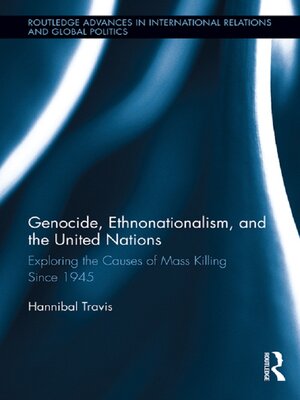Genocide, Ethnonationalism, and the United Nations
ebook ∣ Exploring the Causes of Mass Killing Since 1945 · Routledge Advances in International Relations and Global Politics
By Hannibal Travis

Sign up to save your library
With an OverDrive account, you can save your favorite libraries for at-a-glance information about availability. Find out more about OverDrive accounts.
Find this title in Libby, the library reading app by OverDrive.



Search for a digital library with this title
Title found at these libraries:
| Library Name | Distance |
|---|---|
| Loading... |
Genocide, Ethnonationalism, and the United Nations examines a series of related crises in human civilization growing out of conflicts between powerful states or empires and indigenous or stateless peoples. This is the first book to attempt to explore the causes of genocide and other mass killing by a detailed exploration of UN archives covering the period spanning from 1945 through 2011. Hannibal Travis argues that large states and empires disproportionately committed or facilitated genocide and other mass killings between 1945 and 2011. His research incorporates data concerning factors linked to the scale of mass killing, and recent findings in human rights, political science, and legal theory. Turning to potential solutions, he argues that the concept of genocide imagines a future system of global governance under which the nation-state itself is made subject to law. The United Nations, however, has deflected the possibility of such a cosmopolitical law. It selectively condemns genocide and has established an institutional structure that denies most peoples subjected to genocide of a realistic possibility of global justice, lacks a robust international criminal tribunal or UN army, and even encourages "security" cooperation among states that have proven to be destructive of peoples in the past.
Questions raised include:







